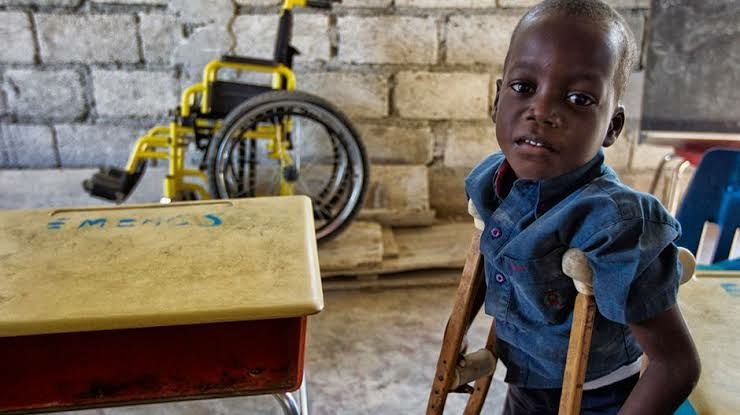On Wednesday, the Inclusive Friends Association (IFA) advocated for free education for Persons With Disabilities (PWDs) of school age in Nigeria.
The call was made by IFA at a press conference on Gender and Disability Based Violence, which was held in Abuja as part of the Amplifying Voices Project’s Third Cohort Fellowship Programme, which was funded by the Ford Foundation.
Grace Jerry, Executive Director of IFA, stated that the call to make education free became necessary in order to combat disability-based violence in Nigeria.

According to Jerry, survivors’ capacity should be built around defense mechanisms and how to seek redress, as this would drastically reduce the culture of silence among survivors.
She stated that previous interactions with PWDs revealed that discrimination, stigma, and stereotypes all played important roles in fostering a culture of silence among survivors of various forms of violence.
“Because of this fear, cases of violence against people with disabilities have gone largely unreported, leaving survivors voiceless and invisible.”
“As a result, IFA saw the need to establish a network of youth advocates with disabilities and strengthen their capacity to highlight and address incidents of gender-based violence against women and girls with disabilities across the country.”
“Two disabled youth advocates were chosen from two states in each of the six geopolitical zones with the highest number of GBV cases recorded during the COVID 19 pandemic.”
“The states chosen are Abia, Anambra, Bauchi, Benue, Cross Rivers, Ekiti, Gombe, Katsina, Lagos, Plateau, Rivers, Sokoto, and the Federal Capital Territory of Abuja,” she said.
Jerry stated that IFA, with the support of the Ford Foundation, launched the Amplifying Voices Project in February 2021 with the goal of training young people with disabilities from various states.
She stated that they would serve as Fellows to combat Gender Based Violence (GVB) against People with Disabilities through tenacious and strategic Advocacy.
The rationale for this methodology, according to Jerry, was that advocates would be more comfortable engaging in familiar territory, and their audience would be more receptive to the message, resulting in a paradigm shift.
She stated that IFA organized a five-day intensive training for all selected advocates with disabilities, known as cohort and two, with key topics on gender and development, advocacy, disability, and gender-based violence.
She stated that the term “disability-based violence” was coined during the training because it became clear that lumping issues of people with disabilities alongside general issues of GBV would not allow for the mainstreaming of solutions and interventions.
Olawunmi Okupe, Programme Officer, Gender, IFA, stated that during the intervention, the advocates discovered that PWDs and their caregivers were unaware of what constituted violence.
“Many people with disabilities are unaware of what actions, omissions, or statements constitute a violation and, as a result, continue to see it as normal because society has programmed them to do so.”
“Cases in which family members lock up people with disabilities in isolation, forcefully marry them off, deny them education or other basic necessities are not only wrong, but also a violation of fundamental human rights.”
Another finding, according to Okupe, was the attitudes of law enforcement agencies toward cases of disability-based violence, adding that in most cases, police officers were reluctant to hear complaints or conduct thorough investigations on reports made by PWDs.
She added that the findings revealed the indifference of other members, as a greater number of people without disabilities are unconcerned about what happens to people with disabilities “who are not directly related to them.”
She went on to say that poverty was a major reason why people with disabilities continued to be abused because they didn’t have the means to fend for themselves.
Another factor, according to Okupe, was illiteracy, which could mean a lack of formal education or a lack of skills that would allow people with disabilities to become self-sufficient.
According to Ms Freky Andrew-Essien, Executive Director of Faecare Foundation and Amplified Voices Facilitator, following the findings, IFA called for more people with disabilities, their families, and caregivers to be educated about Disability Based Violence.
Andrew-Essien stated that they should be educated on what was acceptable and what was not, what constituted a violation, and what to do if they were violated.
According to her, IFA wants law enforcement agencies to build capacity on disability issues in order to eliminate attitudinal, physical, or systemic barriers that people face when attempting to access their services.
Andrew-Essien urged media outlets to report on issues affecting people with disabilities as part of their corporate social responsibility in order to educate the public.
She stated that this would make them more aware of and concerned about issues affecting people with disabilities, so that they would no longer stigmatize survivors of any form of violence or their families, and that they would be able to stand up and speak out for them from now on.
She suggested that other corporations support media campaigns and projects that protect the rights of people with disabilities.
According to Andrew-Essien, IFA has urged the government to strengthen social protection systems and mainstream such programs to meet the needs of people with disabilities.
She also stated that the government should put in place the 5% employment quota mandated by the Disability Act.
She stated that implementing these and other poverty-reduction measures would reduce the vulnerability of people with disabilities to disability-based violence and provide them with the means to seek justice when the need arose.

















Discussion about this post